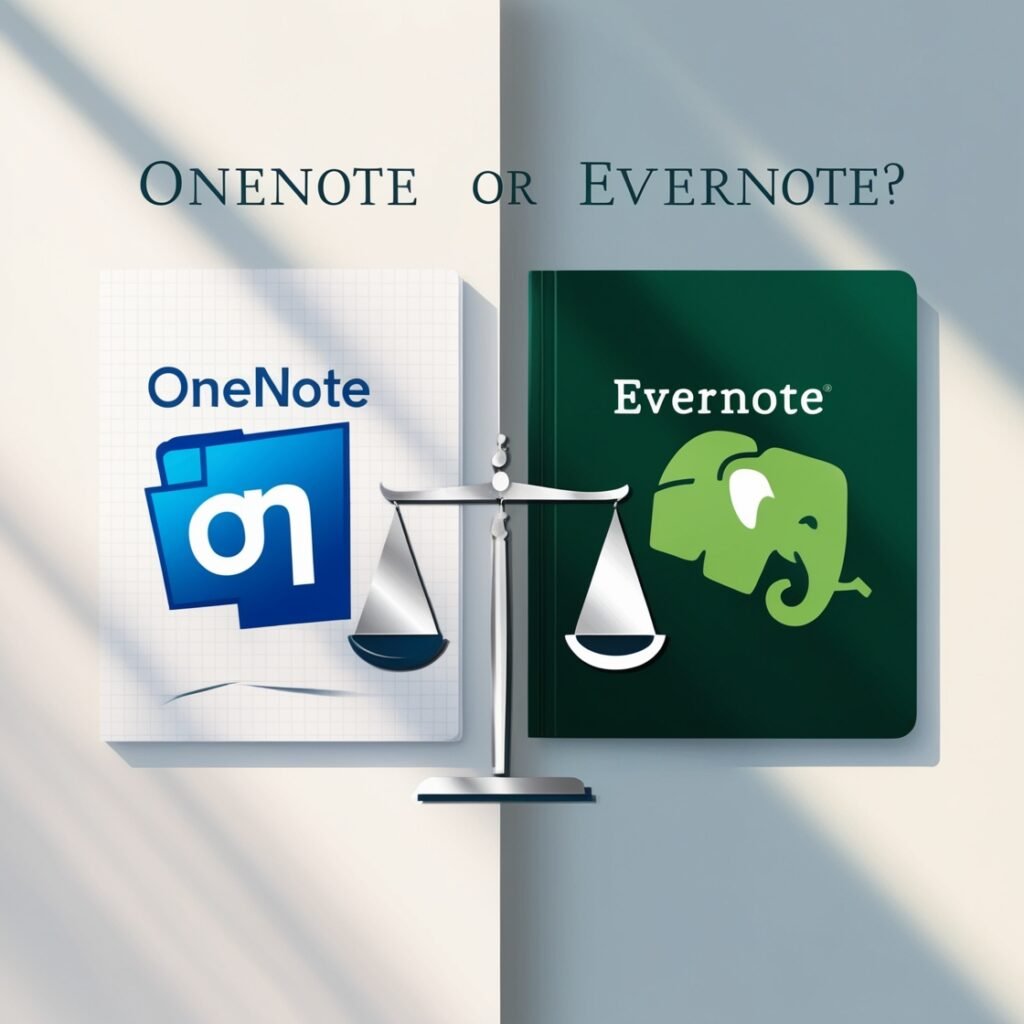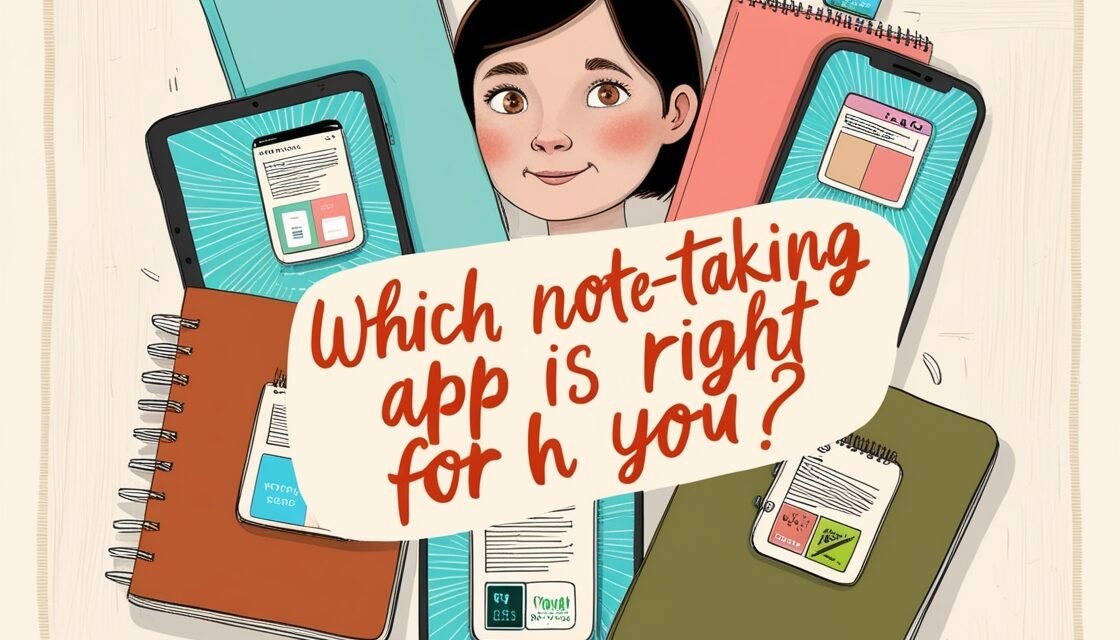Which Note-Taking App Is Right for You?
If you are a student or professional, or if you simply enjoy writing ideas, having a good note-taking app can change your life. Microsoft OneNote and Evernote are among the most common. However, when you have to pick one, which on is more suitable? Each have their advantages and disadvantages, it just depends on what suits you best according to your needs and tastes.
With this backgrounder in mind, let’s dissect and contrast OneNote vs. Evernote one-on-one: By the end of this, you will have your best app idea!

Pricing: Free vs. Premium
Let’s talk about dollars and cents (or pounds, euros—whatever floats your boat). Pricing is always a key consideration when selecting a tool, particularly one intended for long-term use.
OneNote Pricing:
OneNote is completely free to use. You don’t have to pay a dime to get full access to its features as long as you have a Microsoft account. The only limit you’ll encounter is the storage space tied to your OneDrive account. You get 5 GB of free storage through OneDrive, and you can upgrade to more space with a Microsoft 365 subscription (starting at around $69.99/year).
Evernote Pricing:
Evernote offers three pricing tiers:
- Free: Includes basic features with a 60 MB upload limit per month and syncing across only two devices.
- Personal ($10.99/month): Offers more features, like syncing across unlimited devices and 10 GB of monthly uploads.
- Professional ($14.99/month) adds even more features, such as advanced search features and more integration options.
Our verdict: OneNote (though only if you need something that’s completely free!). Though, for more advanced features and payment Evernote gives you the next level (for a fee).
User Interface and Experience
Your note-taking experience often hinges on how the app looks and feels. An intuitive interface can greatly improve the overall user experience.
OneNote Interface:
OneNote’s interface is a bit like a digital version of a physical notebook. You create sections and pages within laptops, and keeping things organized is easy. The interface is pretty straightforward but can feel cluttered if you’re not used to it.
One of the best things about OneNote is its flexibility—you can write anywhere on the page, drag images, doodle, and arrange things as you please. It’s like having a freeform canvas, which makes it great for creative thinkers or anyone who likes a bit of chaos in their note-taking..
Evernote Interface:
Evernote has a more formal approach, instead. Writing an Integration with EvernoteClearly, you can write an integration that saves your notes into a separate database in a way that is completely transparent to the end user – effectively turning Evernote itself in something much more like how it looked 3 years ago: So now, Evernote users continue using most of this amazing system instead of plain old note taking (which has not changed and stayed suboptimal). It is neat and orderly, simple to follow -> for readers who like a simpler & order fashion.
Evernote beats Notejoy in searching as well. OneNote: Great for text-based searches within notes and even in images and PDFs if you have a premium account. Meaning Evernote is the best fit for people who love to get an implacable and search capabilities.
Verdict: OneNote might be better if you prefer a more freeform style where you can arrange notes however you want. However, Evernote is the winner if you value clean organization and powerful search features.
Organization: Notebooks, Sections, and Tags
Both apps have a system to keep things in order, such as keeping your notes tidy.
OneNote’sOneNote’s Organization:
OneNote lets you create Notebooks, which are divided into Sections; within those sections, you can create individual Pages. It feels like a real-world notebook, where you flip between sections and jot things down wherever you want.
There’sThere’s also a search function, but it’sit’s less potent than Evernote’sEvernote’s. You can tag your notes, but OneNote doesn’tdoesn’t use tags as extensively as Evernote does.
Evernote’sEvernote’s Organization:
Although Evernote follows a structure similar to Notebooks, it also stresses utilization of Tags as well. If you’re all about cross-referencing or particular notes that belong to a few different categories, then Tags are your friend. With tags, you can filter and search and boom—a new layer of organization is born.
Searching is easily one of the biggest strengths of Evernote, ever made.
If you’reyou’re the kind of person who likes to dump all your notes into one big pile and rely on search to find them later, you’llyou’ll love this feature.
Verdict: Evernote takes the lead if you like using tags and advanced searching to keep things in order. But if you’re comfortable with a traditional notebook-like structure, OneNote’s organizational style will work fine.
Features and Integrations
Here’s where things get interesting—what extra features do these apps offer, and how well do they compete with others?
OneNote Features:
- Integration with Microsoft products: Since OneNote is part of the Microsoft family, it integrates seamlessly with Office apps like Word, Excel, and Outlook.
- Handwriting and drawing: You can use a stylus or your finger to take handwritten notes, which is perfect if you’re using a tablet like the Surface Pro.
Collaboration — share notebooks with others and collaboratively work in realtime (good for teams or group projects)
OneNote offline — You can access OneNote whilst not on the internet as well.
Evernote Features:
- P.S — PS: The Evernote web clipper is your best friend!!. It allows you to grab articles, images, and web pages straight from your browser and import them into Evernote.
- Search: As mentioned before, Evernote’sEvernote’s search feature is super powerful, even allowing you to search text inside images and PDFs (with a premium account).
- To-do lists: Basic to-do lists are baked into Evernote: checklist, reminders, due dates.
- Integrations: While Evernote integrates with apps such as Google Drive, Slack and Trello, it works best for people already using multiple tools.
Verdict: OneNote is unbeatable for integration with the Microsoft ecosystem. But Evernote pulls ahead if you’re into web clipping and heavy searching.
Collaboration and Sharing
Working together on notes is almost a necessity today, especially for teams or students. Let’s see how both apps handle collaboration.
OneNote Collaboration:
OneNote allows you to share entire notebooks with others and collaborate in real-time. Since it’sit’s tied to your Microsoft account, it works seamlessly with people using Microsoft products.
Evernote Collaboration:Evernote actually supports collaboration as well, although it’s a bit more restrictive unless you’re on one of the higher-tier plans. For a premium account, you will be able to share notes/notebooks so that other members of your team can view and edit them as well. But the core strength of Evernote is that it syncs your notes to all your devices so you can have access to them wherever you are..
Verdict: Both apps provide strong collaboration features, but OneNote is more generous when it comes to free sharing options.
Storage and Syncing on multiple devices
Sync and storage: Relevant, especially if you engage with multiple devices like laptop/phone/tablet.
Keeps Files Synced and Stored Across Device
However, your syncing and storage needs also become major considerations if you use more than one device on a regular basis — such as a laptop and a tablet or smartphone.
OneNote Storage & Syncing:
With OneDrive-powered sync that provides 5 GB of free storage and works across all devices, it’s virtually impossible to lose a note. This storage can be further extended with a Microsoft 365 subscription. Syncs seamlessly on Windows, macOS, iOS & Android
Evernote Storage & Syncing:
You can sync your notes across devices, but the free plan limits you to only two simultaneous device connections. You need to pay for more than two devices. On the downside, the free tier only gives you a 60 MB / month upload cap, which might end up feeling limited if you have to deal with larger files.
Verdict: OneNote’s free plan offers more flexibility in terms of device syncing and storage, while Evernote starts to charge once you need to sync across more than two devices.
Final Verdict: OneNote or Evernote?

Having trouble deciding between OneNote and Evernote? Here’s a quick summary:
Go for OneNote if:
- You use other Microsoft products.
- You want a totally free app with no major restrictions.
- You like a flexible, notebook-style setup.
- You need good collaboration features without extra costs..
- Choose Evernote if:You rely on powerful search features (like searching within images and PDFs).
- You like using tags for organization.
- You want to clip web content easily.
- You don’t mind paying for premium features for more storage, syncing across unlimited devices, and integrations.
Both apps are excellent, and your choice depends on how you plan to use them. If you’re looking for a free and solid option with great integration into the Microsoft ecosystem, OneNote is a fantastic choice. However, if you’re a power user who needs advanced organization and search capabilities to keep track of many different things, then Evernote would be worth the price.
So, what will OneNote’s flexibility or note’s precision be? The choice is yours!





